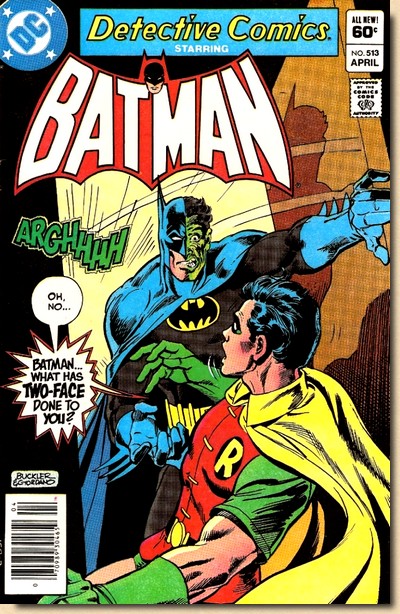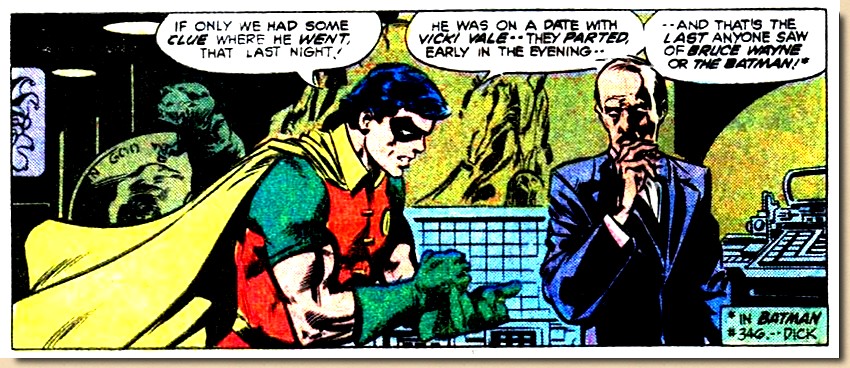| Five days after
Batman's as of yet undiscovered capture
by Two-Face many inhabitants of Gotham -
law-abiding and not - are wondering about
the reasons for the lengthy disappearance
of the Caped Crusader. As
Robin and Alfred find themselves fearing
the worst, Vicki Vale storms the Wayne
Building telling Alfred that she knows
for fact that Bruce Wayne is Batman and
thus in danger...
All the
while, Batman is imprisoned in a room
behind a glass separating wall in
Two-Face's halfway house hideout, spared
only by a chance as Dent's tossing of his
coin - in order to decide whether to kill
the Batman or spare him - ends in a
repetitive series of the unscarred side
of the coin coming up on top, thus
postponing any action so far.
However, as
Two-Face and his gang rob the Duo Record
Company a guard manages to raise the
alarm and thus leads Robin to the scene
of the crime. Although Two-Face manages
to get away, Robin finally learns about
Batman and the halfway house from one of
Dent's crooks.
As Two-Face arrives
back at the halfway house his toss of the
coin finally brings up the scarred side,
but Batman sabotages a pipe to fill up
his cell with steam, and from this he
emerges with half of his mask showing a
horribly scarred face...
|
|
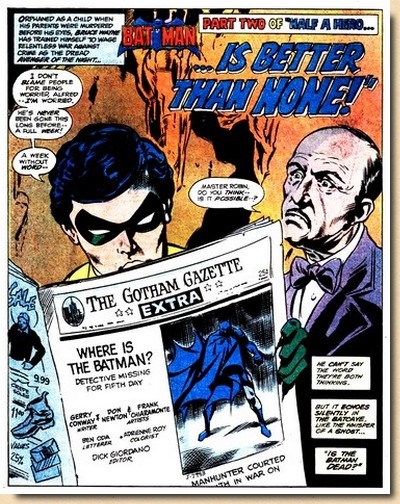
|
|
|
| |
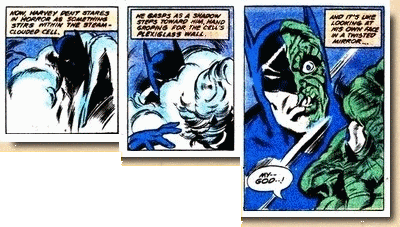 |
|
Completely confused, Two-Face
releases Batman, who then gets the upper hand
over Dent just as Robin and the police arrive. The horror and shock of
seeing a "Two-Face Batman" quickly
subsides as Batman explains that it is only a
mask, fashioned from a plastic tray which he had
been handed together with his food.
Using this decoy
allowed the Batman to throw Two-Face
psychologically off his mark as he exploited
Dent's unstable personality in the face (no pun
intended) of dualities, thus gaining the upper
hand at the decisive moment.
|
|
| |
| In
other places, former Police Commissioner Jim
Gordon contemplates the ruins of his professional
life whilst "Boss" Thornton is pleased
with having pushed Gordon out of office in order
to plant one of his men - though he also feels
troubled as in his mind he is seeing a ghost...
the ghost of Hugo Strange. As all goes back to normal,
Bruce Wayne tells Dick and Alfred that he has
decided that living in the centre of Gotham makes
Bruce Wayne too accessible and hinders his
activities as Batman - and that therefore they
will all return to Wayne Manor.
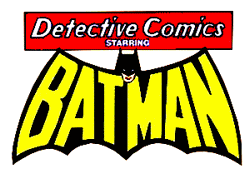
|
|
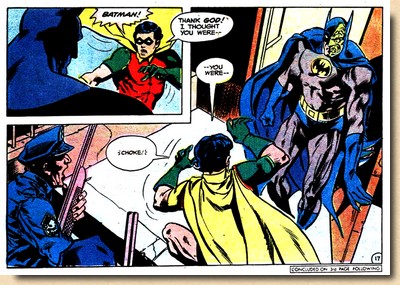 |
|
| |
| |
REVIEW & ANALYSIS
The
conclusion to the second 1982 story crossover from
Batman into Detective Comics is concerned
more with the main story event involving Two-Face and the
imprisoned Batman and deals less with the numerous
subplots which Gerry Conway set up for the task of
turning Batman and Detective Comics
into a de facto single Batman title with a
shared continuous plot and storylines.
|
| |
| Although this would suggest a
smoothly flowing story for Detective Comics #513
due to the more linear plot mechanics, the result
is strangely staggered in places. Whilst Conway
showed quite some courage in setting up a complex
first part to this story in Batman #346, the
conclusion presented here almost feels like an
anti-climax - the flow of events seems almost too
simplistic, and the story never really builds up
speed.
Even
Batman's trick with his Two-Face mask doesn't
really sit right, even though it is an
interesting plot device as Conway has Batman
tackle Two-Face precisely where Dent is at his
weakest: on the level of self-perception and the
psychology of identity. It is certainly more
interesting than any simple physical tackle could
ever be, but at the same time it feels highly
construed and improbable under the circumstances
- in other words, a typical deus ex machina,
i.e. an "out of the blue" plot saving
device.
|
|
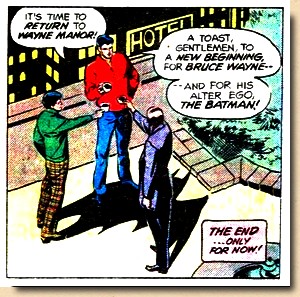 |
|
| |
| The
storytelling is also hampered by repeatedly featuring
highly marked exposition (i.e. explanatory content often
set into the dialogue of characters and sometimes even
into monologue) on who exactly Two-Face is and how he
ticks - even readers completely unfamiliar with the
character may find it a bit strange that Two-Face
exclaims (to himself? to the world at large?) that the
horrible accident he suffered not only scarred his face
but also gave him a modus operandi... From a
comic book history perspective, Detective Comics #513
would seem to show where exposition in 1970s and 1980s
comics got its bad name from. |
| |
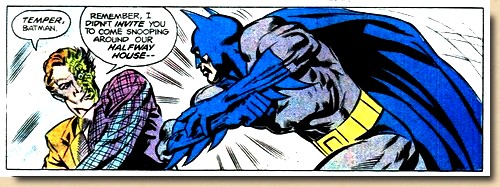 |
|
Many 1970s and 1980s comic
books featuring a somewhat lacklustre story are
ultimately saved by the artwork, and this is
especially true for the Batman titles. In the
case of Detective Comics #513, however,
Don Newton doesn't quite pull it off either. Some
of his panels display his talent to virtually
grab the reader and pull him or her into the
page, but many others are not as captivating as
usual, adding further to the overall effect of a
slow story which never really clears the runway. |
|
| |
| On the more
positive side, Gerry Conway adds yet more promising
changes to the world of Bruce Wayne and Batman as he
announces the return to Wayne Manor. Interestingly,
Conway virtually reverses the original motives of Bruce
Wayne to leave Wayne Manor after Dick Grayson went off to
college - namely deciding at the time that besides being
in a largely empty house without Robin (who now has
returned) he would be more effective as Batman if he was
closer to Gotham City. ACCIDENTAL READING - Somewhat slow
story despite an extra amount of Bat-Psychology
|
| |
| |
FACTS & FIGURES
Bruce Wayne's decision to
close Wayne Manor came about in Batman #217
(December 1969) and was primarily motivated by editor
Julius Schwartz's plan to streamline and update the
series. On the content level, this meant sending Dick
Grayson off to Hudson University (and thus kicking off
his backup solo series in Detective Comics #394)
and moving Bruce and Alfred into the Wayne Foundation
building penthouse. However, in spite of the perceived
efficiency of a home in the heart of Gotham, Batman soon
found himself returning to the Batcave beneath Wayne
Manor every now and then, and indeed with increasing
frequency. Over the years, various authors and editors
tried to break the ties with the past by e.g. having the
Batcave destroyed by an earthquake or replaced by an
entirely new Batcave underneath Wayne Manor. But in the
end, tradition prevailed, and the changes instigated by
Julie Schwartz were mostly undone in 1982 when editor
Dick Giordano and writer Gerry Conway took the Batman
titles back to their roots - Batman #344 finally
reunited Batman and Robin as a team on a permanent basis,
and following Bruce Wayne's declaration to return to
Wayne Manor in Detective Comics #513, the trio
moved there in Batman #348 and thus also returned to the
original Batcave, complete with its giant penny, robot
dinosaur and other memorabilia.
The Batman
feature from Detective
Comics #513 has not been reprinted since its original
publication, but it was used for several foreign market
editions almost immediately following its original
publication, namely Batman
Taschenbuch #17 (Egmont Ehapa, German edition for
Germany, Switzerland and Austria, 1982), Superserien
#20 (Semic, Norway, 1982) and Batman #8
(Federal, Australia, 1983).
|
| |
COMMENTS FROM THE BATCAVE
|
| |
 |
|
"I truly appreciate
your efforts to return Batman to his roots and
Gerry is to be commended for handling the
adventures so well. The Batman is certainly his
forte. The legend lives on. Long live the
Batman!" (Karl Kibodeaux, Freeport TX)
"I'm
excited about what's going on in the Batman
books." (Rod Osborn, Princeton IN)
(from the letters page of Detective
Comics #518)
|
|
| |
| |
BATMAN and all
related elements are the property of DC
Comics, Inc. TM and © DC Comics, Inc., a
subsidiary of Time Warner Inc.
The illustrations presented here are
copyright material. Their reproduction
for the review and research purposes of
this website is considered fair use
as set out by the Copyright Act of 1976,
17 U.S.C. par. 107.


(c) 2012-2016
uploaded
to the web 13 November 2016
|
|
|
| |
|

